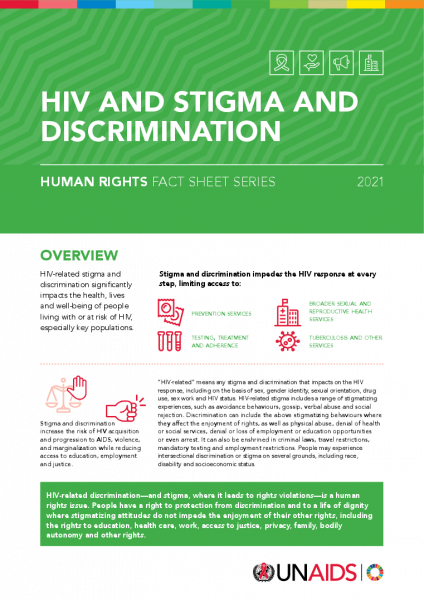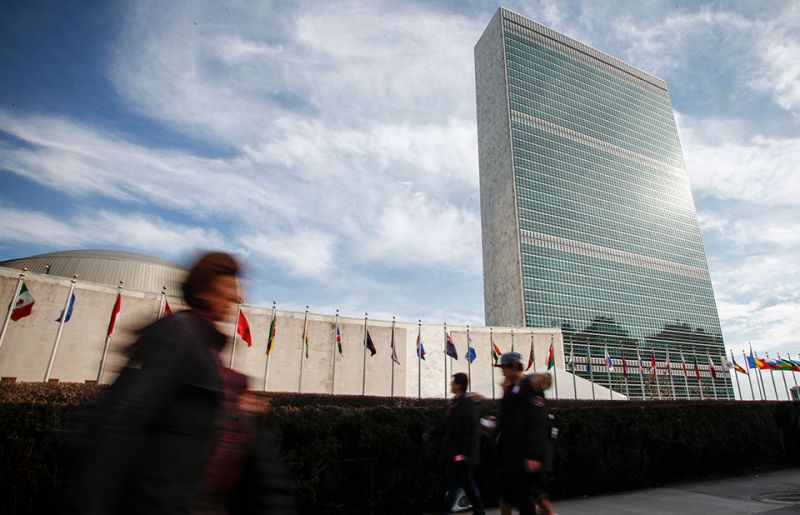Inequalities and human rights barriers, which have been magnified by the COVID-19 pandemic, are preventing progress towards ending AIDS as a global public health threat by 2030. They facilitate the transmission of HIV by increasing vulnerability to HIV and limiting access to health services, particularly for gay men and other men who have sex with men, transgender people, people who use drugs, sex workers, women and girls.
Ending inequalities is both a human rights imperative and a public health necessity. Yet, despite repeated commitments, human rights barriers that drive inequalities, such as stigma, discrimination, violence and punitive laws, continue to undermine the HIV response.
To highlight the critical need for progress on human rights barriers, and to call on all stakeholders to play their part to increase action, UNAIDS convened civil society partners, United Nations Member States, jurists and development organizations on the sidelines of the United Nations High-Level Meeting on AIDS in New York. At the event, From Promises to Action: Scaling Up Efforts against Human Rights Barriers, including HIV-Related Stigma and Discrimination, which took place on 9 June, the panellists emphasized the critical need to generate long-term investment and transformative action on human rights and stigma and discrimination, particularly on discriminatory criminal laws, in order to change structural and social barriers and, ultimately, reduce inequalities.
The panellists exchanged best practices, discussed how human rights-based and gender-transformative approaches could reduce inequalities and issued a call for a rapid scale-up of funding, commitment and action in this area to reach the people most left behind.
The event served as a reminder that 62% of new HIV infections in 2019 were among key populations, who are still criminalized in many countries, and their sexual partners, that due to gender inequality and harmful gender norms, AIDS is still one of the leading causes of death among adolescent girls and young women in sub-Saharan Africa and six out of seven new HIV infections among adolescents (aged 15 to 19 years) in the same region are among girls.
The event also provided hope that action and change is possible. During the event, the Governments of Angola, Costa Rica and the Gambia announced that they are joining the Global Partnership for Action to Eliminate all Forms of HIV-Related Stigma and Discrimination.
At the event, Winnie Byanyima, the UNAIDS Executive Director, called on the international community to rally behind the bold new targets and commitments laid out in the Global AIDS Strategy 2021–2026. She highlighted that the strategy was a crucial development, as it set for the first time specific targets to reduce the societal enablers driving inequality, giving them the same priority and commitment as biomedical interventions.
Having new targets means that there is a need for new tools and guidance, and Ms Byanyima unveiled a new series of human rights fact sheets to support action by all stakeholders on removing human rights barriers, such as criminal laws, stigma and discrimination. The series is available in multiple languages: in addition to English, French, Russian and Spanish (follow the language menu on the top right), it's also available in Portuguese (1, 2, 3, 4, 5, 6, 7).
“Failure to make any progress across all societal enablers would undermine prevention, testing, treatment and viral suppression targets, resulting in an additional 1.7 million AIDS-related deaths and 2.5 million additional new HIV infections between 2021and 2030. Failure is therefore not an option.”
Winnie Byanyima Executive Director of UNAIDS
“Community leadership is an important component in empowering the community to speak out and raise their issues of concern as to the root causes and drivers of stigma and discrimination. These issues can only be addressed if stakeholders across all levels work together in strong partnership with the community.”
Harry Prawobo Asia-Pacific Regional Coordinator of the Global Network of People Living with HIV
“Reaching this vision, however, requires increased and long-term funding for human rights programmes. We know that breaking down human rights-related barriers to health is key for a healthier, fairer and more resilient world. So let’s seize the opportunity and build back better.”
Peter Sands Executive Director, Global Fund to Fight AIDS, Tuberculosis and Malaria
“If our actions in the AIDS response had been more focused on rights and non-discrimination, gender, socioeconomic integration and universal access, the response to COVID-19 would have been significantly stronger.”
Souhaila Ben Said President of the Association Tunisienne de Prévention Positive
“The HIV pandemic is not over. Our strategy to end it must focus on addressing stigma and eliminating inequalities that are impeding full access to health-care services.”
Loyce Pace Director of Global Affairs, Department of Health and Human Services, United States of America





